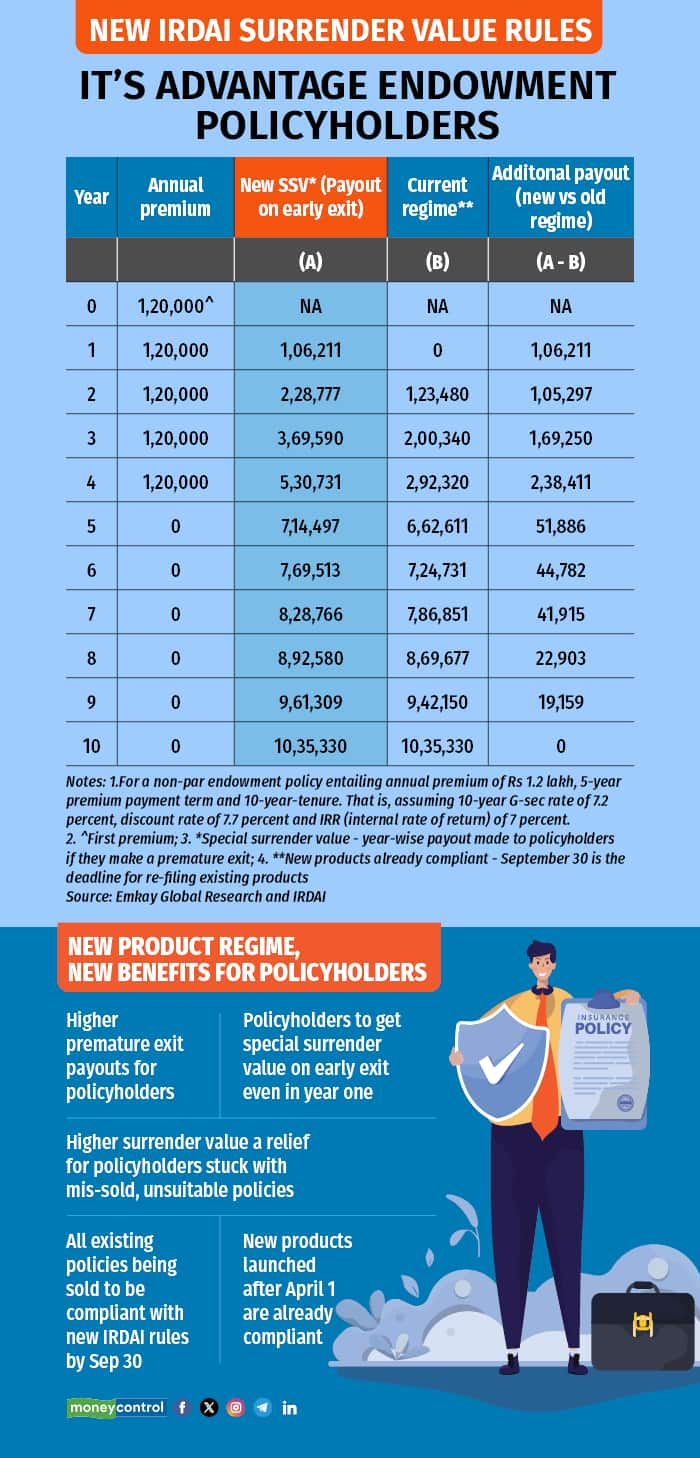



Come October, and the new higher-payouts-on-early-exit regime will commence in the life insurance space.
This is part of the larger, updated insurance product regulations issued by the Insurance Regulatory and Development Authority of India (IRDAI) in March, followed by the master circular with detailed norms in June.
While the rules were already applicable to new products launched since then, the regulator had granted life insurance companies time till September 30 to re-file their existing plans to comply with the new norms.
Lower penalty for premature exitIn simple terms, compared to the present scenario, the special surrender value (SSV) — payout on premature exit — for endowment policyholders because of mis-selling or inability to pay premiums will go up.
Unlike now, when policyholders lose the entire premium paid if they exit after year one, once the new policy kicks in, they will get a part of their premium back. For insurers, their margins in the non-participating, guaranteed-return category of endowment plans will be the most affected. There will be no change in the surrender value of unit-linked insurance policies and pure protection term covers.
Majority of life insurance companies had, in May and June, vociferously opposed this move citing an ALM (asset-liability management) mismatch as these are meant to be long-term plans and providing for liquidity in the interim is not the goal. They had argued that the new rules would not be in the interest of persisting (those who stay through the term) policyholders as their returns would be compromised.
“Our alternative solution was to allow complete refund of premiums in case of mis-selling, rather than offering higher surrender values. The upfront charges are high and it is difficult to recoup the commissions paid in the initial years,” said the CEO of a large private life insurance company.
The saga of surrender charges and values started way back in December 2022 and several drafts and discussions later, finally culminated in new product rules in March 2024, followed by a master circular detailing the special surrender value computation, among other provisions, in June 2024.
Also read: How to avoid falling prey to life insurance mis-selling traps

However, some life insurers, besides experts, have supported the new regulations, asserting that policyholders would benefit, as many tend to let their policies lapse in the early years.
“At heart, the higher surrender value regulations treat the policyholders fairly (both lapsed and persistent), and prevent the insurers from excessively rewarding distributors at the expense of lapsed policyholders. The surrender value clause (after paying one annual premium) will force insurers to link commissions with persistency by moving to trail-based commissions, or having a claw back provision for the first year's commission, in case of early surrender,” said Avinash Singh, Senior Research Analyst, Emkay Global, in a note issued after the master circular's release. This could, theoretically, curb cases of mis-selling to an extent.
According to Emkay's calculations, a policyholder buying a non-par endowment policy with an annual premium of Rs 1.2 lakh, a five-year premium paying term, and a tenure of 10 years will now get Rs 1.06 lakh if she were to surrender after paying the first premium. At present, she has to forgo the entire amount.
Customer information sheet for easy decodingWhile revision in surrender value norms is the most important change that will take effect from October 1, several other rules, too, will come into force for existing policies.
In the case of health and general insurance, the insurance regulator has made it mandatory for life insurers to issue a Customer Information Sheet (CIS) as part of the policy documents. The CIS is supposed to contain information on clauses, policy benefits, premiums, and terms and conditions in simple language and a concise manner, and will be of use to policyholders who find the complex language intimidating and difficult to comprehend.
Insurers to pay more for ineffective grievance redressalTo resolve complaints about insurers not complying with the insurance ombudsman's orders on time, the IRDAI has introduced additional penalties. Insurers will now have to pay policyholders Rs 5,000 a day if they do not honour the ombudsman's order within 30 days.
Discover the latest Business News, Sensex, and Nifty updates. Obtain Personal Finance insights, tax queries, and expert opinions on Moneycontrol or download the Moneycontrol App to stay updated!
Find the best of Al News in one place, specially curated for you every weekend.
Stay on top of the latest tech trends and biggest startup news.